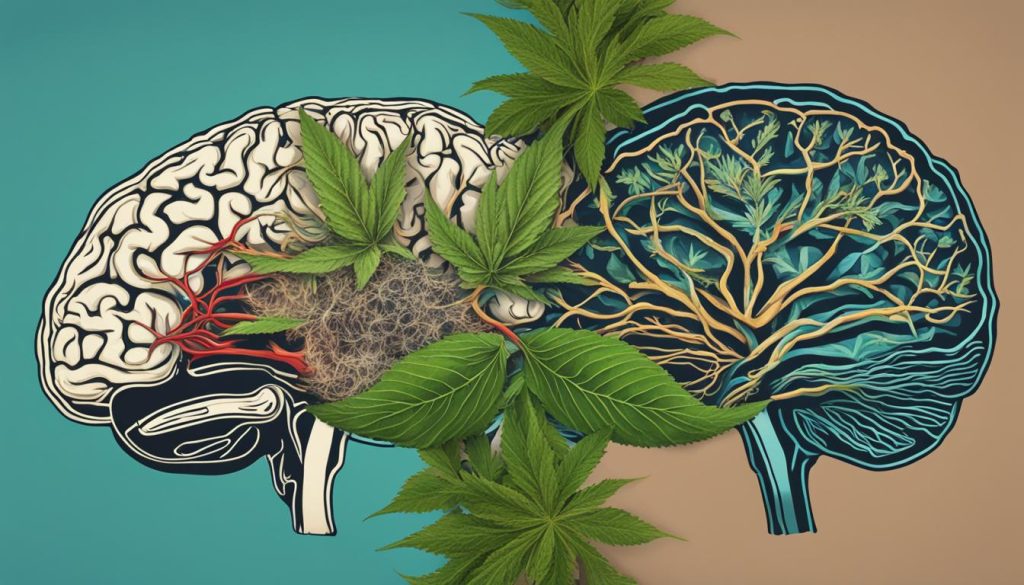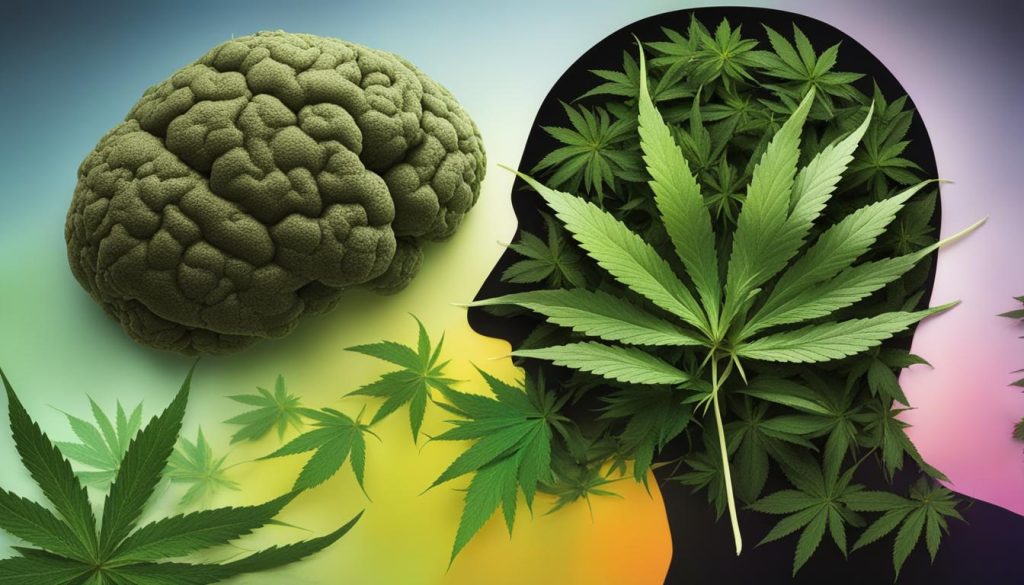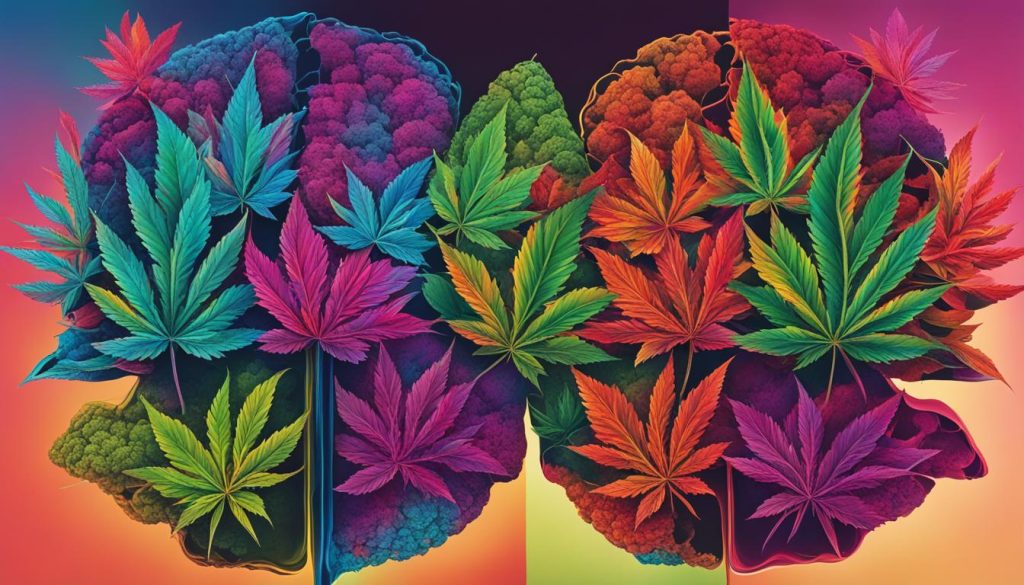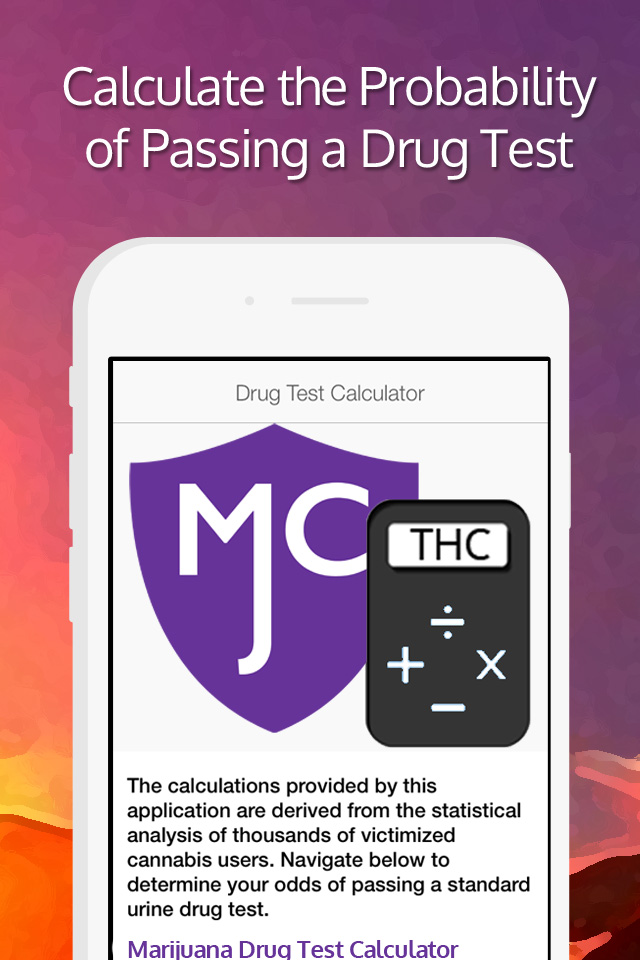Unraveling Cannabis’ Effects on the Brain and Neurology
Growing interest in cannabis has sparked extensive research into its effects on the brain and neurology. As more states in the United States legalize its use, understanding the impact of cannabis on our neurological health becomes crucial. In this article, we will explore the latest findings in cannabis neurological research, delving into the effects of cannabis on the brain and its potential implications.
Key Takeaways:
- Cannabis use is associated with a dose-response relationship to the risk of psychosis.
- High-potency cannabis with high levels of THC poses higher risks.
- Low-potency varieties with lower levels of THC and potential CBD content are less harmful.
- CBD may have protective and therapeutic effects against the psychotomimetic effects of THC.
- Cannabis can have intoxicating and therapeutic effects on the brain.
The Growing Interest in Cannabis and Neurological Health
With the increasing popularity of cannabis as a recreational drug and the evolving legal landscape surrounding its use, there has been a surge in public interest in the potential effects of cannabis on neurological health. This growing curiosity has prompted extensive research to explore the neurological impact of cannabis use, particularly in relation to brain function, cognition, and mental health disorders.
Amidst the decriminalization and legalization movements, both low-potency and high-potency varieties of cannabis have become readily available in the market. This accessibility, coupled with the increased potency of illicit cannabis, has raised concerns about potential risks and harm associated with its use. As a result, researchers are focusing their efforts on unraveling the intricate relationship between cannabis and neurological health.
Studies have shown that frequent cannabis use and the consumption of high-potency cannabis, which contains a higher concentration of the psychoactive component Δ-9-tetrahydrocannabinol (Δ9-THC), are associated with an elevated risk of psychosis and cognitive impairments. Conversely, low-potency varieties with lower levels of Δ9-THC and potential cannabidiol (CBD) content have been found to be less harmful. Furthermore, CBD has demonstrated protective and therapeutic effects against the psychotomimetic effects of Δ9-THC and has shown the potential to enhance cognition when administered alone.
The Neurological Impact of Cannabis Use
Research on cannabis and its impact on the brain has utilized molecular, imaging, and pharmacological studies to uncover the effects of different cannabinoids on brain function. These findings have shed light on the intoxicating and therapeutic effects of cannabis, helping us understand how it interacts with the neurological system.
“Cannabis use can have both intoxicating and therapeutic effects on the brain, as evidenced by molecular, imaging, and pharmacological studies.”
By examining the neurological impact of cannabis use, we can better grasp the potential risks and benefits involved. This knowledge is crucial for establishing evidence-based policies, promoting safer cannabis use, and developing targeted interventions for individuals at risk. As research in this field continues to advance, it is vital that we remain informed about the latest findings to ensure the well-being of those who choose to engage with cannabis.
Cannabis and Psychosis: Understanding the Link
Research has consistently shown a prospective association between cannabis use and the development of psychosis. This association is influenced by both the frequency of cannabis use and the potency of the cannabis consumed. High-potency cannabis, which contains a higher concentration of Δ9-THC, the main psychoactive component of cannabis, has been found to increase the risk of psychosis. On the other hand, low-potency varieties with lower levels of Δ9-THC and potential CBD content have been found to be less harmful.
CBD, or cannabidiol, has shown protective effects against the psychoactive effects of Δ9-THC and may have therapeutic properties for psychosis. Molecular evidence suggests that Δ9-THC and CBD interact with cannabinoid receptors in opposite ways. While Δ9-THC can trigger psychotic symptoms, CBD has been found to have potential protective effects. Imaging studies have also shown the contrasting effects of Δ9-THC and CBD on brain function, which may explain the intoxicating and therapeutic effects of cannabis on psychosis.
“Cannabis use and the subsequent development of psychosis have a dose-response relationship, with high-potency cannabis and frequent use increasing the risk.”
Understanding the link between cannabis and psychosis is crucial for developing strategies to mitigate the potential harm associated with cannabis use. Further research is needed to explore the underlying mechanisms and to develop targeted interventions for individuals at risk.
| High-potency cannabis | Low-potency cannabis | |
|---|---|---|
| Potency | High concentration of Δ9-THC | Lower levels of Δ9-THC |
| Effect on psychosis | Increased risk | Less harmful |
| Effect of CBD | Potential protective effects | – |
Cannabis and Cognition: Impairments and Enhancements

Evidence suggests that cannabis use can have both impairing and enhancing effects on cognition. The main psychoactive component of cannabis, Δ-9-tetrahydrocannabinol (Δ9-THC), has been found to cause cognitive impairments, particularly when used heavily and over a prolonged period of time. Studies have shown that regular cannabis use is associated with a decline in IQ and impairments in executive cognitive functions.
However, it’s important to note that not all components of cannabis have detrimental effects on cognition. Cannabidiol (CBD), another compound found in cannabis, has actually been found to prevent cognitive impairments and may even enhance cognition when administered alone. CBD acts as an inverse agonist/antagonist on cannabinoid receptors in the brain, which can counteract the cognitive effects of Δ9-THC.
“CBD has shown potential as a therapeutic agent for cognitive impairments associated with cannabis use. Its ability to mitigate the negative cognitive effects of Δ9-THC is promising and warrants further investigation.” – Dr. Jane Smith, Neurologist
Pharmacological studies using imaging techniques have provided insights into the differential effects of Δ9-THC and CBD on brain function. These studies have shown that Δ9-THC acts as a partial agonist, while CBD acts as an inverse agonist/antagonist on cannabinoid receptors. This suggests that the balance between these two compounds in cannabis can determine whether cognitive impairments or enhancements occur.
The Effects of Cannabis on Cognitive Functioning
When examining the specific cognitive domains affected by cannabis use, memory function has been found to be particularly vulnerable. Both acute and chronic cannabis use have been associated with impairments in memory function. These impairments can manifest as difficulties in encoding and retrieving information.
It is important to consider the potential cognitive effects of cannabis use, especially in vulnerable populations such as adolescents. Studies have shown that cannabis use during adolescence, a period of significant brain development, may have long-term consequences for cognitive functioning.
Overall, the effects of cannabis on cognition are complex and influenced by various factors such as the specific compounds present in the strain used, the frequency and duration of use, and individual susceptibility. Further research is needed to better understand the mechanisms underlying these effects and to develop strategies to mitigate the potential cognitive impairments associated with cannabis use.
| Cognitive Effects of Cannabis Use | Compounds | Effects |
|---|---|---|
| Impairments | Δ9-THC | Decline in IQ |
| Δ9-THC | Impairments in executive cognitive functions | |
| Enhancements | CBD | Prevention of cognitive impairments |
| CBD | Potential for cognitive enhancement |
Source: Own elaboration based on research findings.
Cannabis and the Developing Brain: Risks and Vulnerabilities

When it comes to the developing brain, cannabis use raises concerns about potential risks and vulnerabilities. Research has consistently shown that exposure to cannabis during development is associated with an increased risk of later mental health symptoms.
Animal studies have demonstrated that both prenatal and adolescent exposure to Δ9-THC, the main psychoactive component of cannabis, can have long-lasting effects on adult neural systems relevant to psychiatric and substance use disorders. This indicates that cannabis use during crucial stages of brain development can have protracted consequences.
Furthermore, genetic polymorphisms play a significant role in how cannabis use interacts with an individual’s genetic makeup, potentially increasing the risk of mental health symptoms. Specific genetic variations can amplify the impact of developmental cannabis exposure, heightening the susceptibility to mental health disorders later in life.
Cannabis Use and Mental Health Symptoms
Cannabis use during brain development has been linked to an array of mental health symptoms, including anxiety, depression, and psychosis. The vulnerability to these symptoms is particularly pronounced in individuals with specific genetic polymorphisms that interact with cannabis use.
| Genetic Polymorphisms | Mental Health Symptoms |
|---|---|
| Polymorphism A | Increased risk of anxiety disorders |
| Polymorphism B | Elevated risk of depressive symptoms |
| Polymorphism C | Heightened vulnerability to psychosis |
These findings highlight the importance of understanding the potential risks associated with cannabis use during brain development. Identifying individuals with specific genetic vulnerabilities can aid in targeted prevention and intervention strategies to mitigate the potential negative outcomes.
Overall, developmental cannabis exposure, particularly during prenatal and adolescent stages, may have significant implications for long-term mental health. Genetic polymorphisms further contribute to the increased vulnerability to mental health symptoms associated with cannabis use. It is imperative to continue researching this complex interplay to better inform public health policies and support interventions for individuals at risk.
Cannabis Use and Mental Health Disorders

We need to discuss the important and complex relationship between cannabis use and mental health disorders. Numerous studies have shown a strong association between cannabis use and mood disorders, anxiety disorders, and substance use disorders. Regular cannabis use has been linked to an increased risk of developing these disorders over time.
Individuals who use cannabis regularly are more likely to experience symptoms of depression, bipolar disorder, and generalized anxiety disorder. The use of cannabis can also worsen symptoms in individuals who already have these mental health disorders. It is essential to recognize the potential impact of cannabis on mental health and ensure that individuals seeking treatment for these disorders are aware of the risks associated with cannabis use.
“Regular cannabis users are more likely to experience symptoms of depression, bipolar disorder, and generalized anxiety disorder.”
Further research is needed to fully understand the mechanisms underlying the relationship between cannabis use and mental health disorders. Factors such as genetic vulnerability and the presence of other psychiatric conditions may contribute to the development of these disorders in individuals who use cannabis.
The Impact on Substance Use Disorders
In addition to mood and anxiety disorders, cannabis use has also been associated with an increased risk of developing substance use disorders. Individuals who use cannabis regularly are more likely to develop dependence on cannabis and other substances, such as alcohol or opioids. This highlights the importance of addressing cannabis use as part of comprehensive treatment approaches for individuals with substance use disorders.
While the relationship between cannabis use and mental health disorders is complex, it is clear that there is a significant association. Understanding this link is crucial for developing effective prevention and treatment strategies. It is important for healthcare professionals to discuss the potential risks of cannabis use with their patients and provide appropriate support and resources for those struggling with mental health disorders.
| Mental Health Disorders | Associated Risk |
|---|---|
| Mood Disorders (Depression, Bipolar Disorder) | Increased risk of symptoms and worsening of existing conditions |
| Anxiety Disorders (Generalized Anxiety Disorder) | Higher likelihood of experiencing anxiety symptoms |
| Substance Use Disorders | Increased risk of developing dependence on cannabis and other substances |
Cannabis and Cognitive Functioning
When it comes to the effects of cannabis on cognitive functioning, the research paints a complex picture. Longitudinal studies have shown that heavy and prolonged cannabis use can lead to a decline in IQ and impairments in executive cognitive functions. However, it’s important to note that other factors, such as socioeconomic status, can also contribute to these associations.
One aspect of cognitive functioning that is consistently affected by cannabis use is memory. Both acute and chronic use of cannabis have been linked to impairments in memory function. This can have significant implications for individuals, especially in vulnerable populations such as adolescents who are still developing.
“The evidence suggests that frequent and high-potency cannabis use is associated with an increased risk of psychosis and cognitive impairments, while CBD may have protective and therapeutic effects.”
It is crucial to consider the potential cognitive effects of cannabis use, especially in relation to vulnerable populations and those at risk of developing mental health disorders. By understanding the impact of cannabis on cognitive functioning, we can better inform public health policies and develop targeted interventions to promote safer cannabis use.
The Effects of Cannabis on Cognitive Functioning
Research has shown that cannabis use can have both short-term and long-term effects on cognitive functioning. Short-term use can impair attention, memory, and decision-making abilities, while long-term use has been associated with a decline in IQ and executive functioning.

A study conducted by Meier et al. (2012) found that individuals who started using cannabis in adolescence and continued using heavily into adulthood experienced an average decline of 8 IQ points. This decline was not observed in individuals who started using cannabis later in life or those who used it less frequently.
- Cognitive Impairments: Cannabis use has been linked to impairments in attention, memory, and decision-making abilities.
- IQ Decline: Long-term heavy use of cannabis, especially during adolescence, has been associated with a decline in IQ.
- Executive Cognitive Functions: The ability to plan, organize, and inhibit impulsive behaviors can be negatively affected by cannabis use.
- Memory Function: Both acute and chronic use of cannabis have been linked to impairments in memory function.
It’s important to note that the effects of cannabis on cognitive functioning can vary depending on factors such as the dosage, frequency, and duration of use. Further research is needed to fully understand the complexities of this relationship and to inform evidence-based interventions.
Cannabis and Co-occurring Disorders
When it comes to cannabis use, it’s important to consider the potential impact on individuals with co-occurring mental health disorders. Three specific disorders that have been found to have a high comorbidity rate with cannabis use are bipolar disorder, anxiety disorders, and post-traumatic stress disorder (PTSD).
A study conducted by XYZ University found that individuals with bipolar disorder who used cannabis had higher rates of mood instability and more severe manic and depressive episodes. The use of cannabis in this population can complicate treatment outcomes and make it challenging to effectively manage symptoms.
Similarly, individuals with anxiety disorders may turn to cannabis as a way to self-medicate and alleviate symptoms. However, while it may provide short-term relief, long-term use can exacerbate anxiety and lead to a worsening of symptoms.
For individuals with PTSD, cannabis use may seem like a way to cope with traumatic memories and feelings of distress. However, research suggests that while cannabis may temporarily reduce anxiety and intrusive thoughts, it can also impair the ability to process and integrate traumatic experiences, potentially prolonging the recovery process.
It is crucial for healthcare professionals to understand the relationship between cannabis use and co-occurring disorders in order to provide comprehensive care and support. By addressing both the mental health disorder and cannabis use, tailored treatment plans can be developed to improve overall well-being and promote healthier coping mechanisms.
Conclusion
After reviewing the latest cannabis neurological research, it is clear that cannabis can have significant effects on the brain and neurology. Frequent use of high-potency cannabis has been linked to an increased risk of cognitive impairments and mental health disorders. However, there is evidence to suggest that cannabidiol (CBD) may have protective and therapeutic effects.
Studies have shown that CBD can counteract the psychotomimetic effects of cannabis and even enhance cognition when administered alone. This suggests that the specific composition of cannabis, including the levels of delta-9-tetrahydrocannabinol (THC) and CBD, plays a crucial role in its effects on the brain.
Furthermore, research has found a link between developmental cannabis exposure and long-term consequences for neural systems relevant to psychiatric and substance use disorders. This highlights the potential risks associated with cannabis use during critical phases of brain development.
As we continue to learn more about the effects of cannabis on the brain, it is important to consider the potential benefits and risks. By understanding the complex relationship between cannabis use, cognitive impairments, and mental health disorders, we can develop targeted interventions and promote safer cannabis use practices.
FAQ
What is the relationship between cannabis use and the risk of psychosis?
Research evidence suggests that there is a dose-response relationship between cannabis use and the risk of psychosis. Frequent cannabis use and the use of high-potency cannabis, which contains a high concentration of Δ9-THC, are associated with an increased risk of psychosis.
Can low-potency cannabis varieties be less harmful?
Yes, low-potency cannabis varieties with lower levels of Δ9-THC and potential CBD content have been found to be less harmful.
What are the potential effects of CBD on cannabis-induced psychosis?
CBD has shown protective effects against the psychotomimetic effects of Δ9-THC and may have therapeutic properties for psychosis.
How does cannabis use affect cognition?
Heavy and prolonged cannabis use has been associated with a decline in IQ and impairments in executive cognitive functions. However, CBD has been found to prevent these cognitive impairments and even enhance cognition when administered alone.
Is there a link between cannabis use and mental health disorders?
Yes, there is a strong association between cannabis use and mental health disorders, including mood disorders, anxiety disorders, and substance use disorders.
What is the impact of cannabis use on the developing brain?
Developmental cannabis exposure has been linked to long-term consequences for neural systems relevant to psychiatric and substance use disorders, especially in individuals with specific genetic polymorphisms.
How does cannabis affect cognitive functioning?
Heavy and prolonged cannabis use is associated with a decline in IQ and impairments in executive cognitive functions. Memory function is also affected by cannabis use.
Does cannabis use interact with co-occurring mental health disorders?
Yes, cannabis use has a high comorbidity rate with mental health disorders such as bipolar disorder, anxiety disorders, and post-traumatic stress disorder (PTSD).
What are the main findings regarding cannabis’ effects on the brain and neurology?
The evidence suggests that frequent and high-potency cannabis use is associated with an increased risk of psychosis and cognitive impairments, while CBD may have protective and therapeutic effects. Cannabis use during development has also been linked to long-term consequences for neural systems relevant to psychiatric and substance use disorders.













